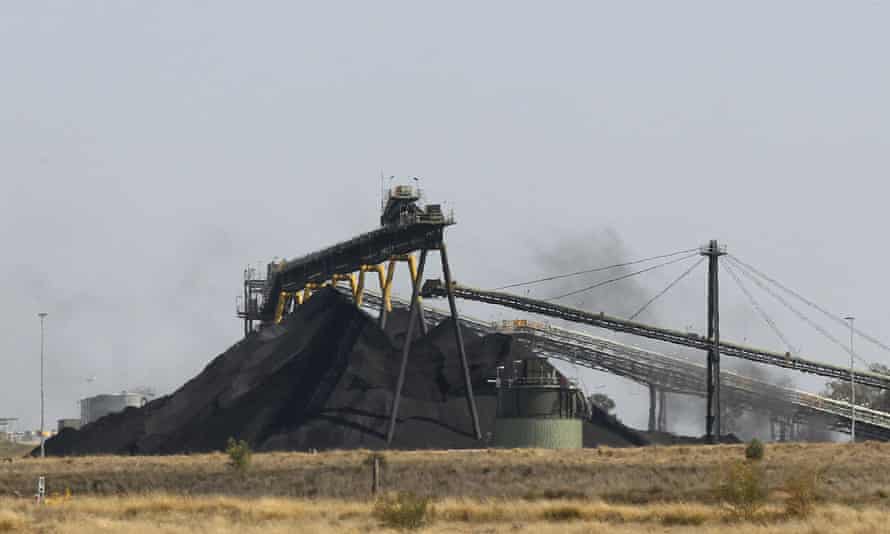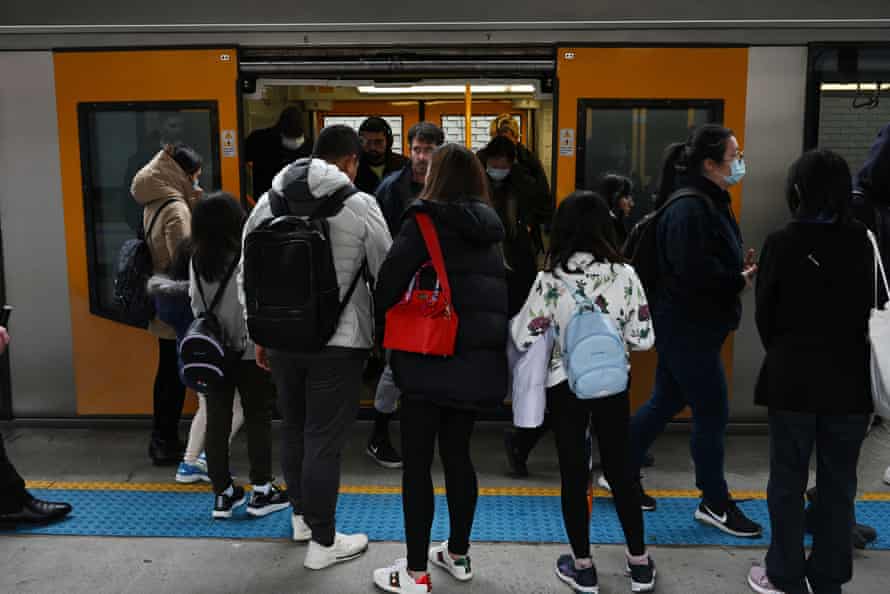
The day that was, Tuesday 5 July
That is where we will leave the live blog for Tuesday.
Here’s what made the news today:
- The Reserve Bank of Australia raised the cash rate by 0.5% to 1.35% as it keeps pushing to get inflation under control. Some experts have tipped it could peak as high as 2.6% in the coming months.
- The treasurer, Jim Chalmers, has said it will get worse over the coming months before it gets better and the economic response will be detailed in the October budget.
- The shadow treasurer, Angus Taylor, has insisted that is too slow, and the government needs to announce its plans now.
- The flood situation in New South Wales is going to continue with rain expected over the next few days, centred towards the mid north coast. There were over 150 flood rescues during the day, and over 200 people turned up to the nine evacuation centres in the state.
- Federal disaster relief payments have been made available to the 23 flood-affected areas in NSW.
- The prime minister, Anthony Albanese, will visit flood-ravaged areas of NSW on Wednesday with the NSW premier, Dominic Perrottet.
- Albanese returned from his trip to Europe and his visit to Ukraine, defending his overseas trips, stressing the importance of international relationships, and the work his team is doing back home.
- Train delays are set for Sydney on Wednesday after the NSW government failed in its case with the Fair Work Commission to have the strike stopped.
- There were at least 46 Covid-19 deaths in Australia reported on Tuesday.
Until next time, stay safe.
Novak Djokovic not included.
More than 460 people received a medical exemption to vaccination rules between December 2021 and end of January 2022, according to Home Affairs FOI log pic.twitter.com/sff1l3aDEb
— Tom McIlroy (@TomMcIlroy) July 5, 2022
20 inmates at youth detention centre in Perth to be moved to new facility at Casuarina prison
About 20 inmates at a youth detention centre in Perth will be moved to the Casuarina prison after what the Department of Justice says has been months of disruption and damage, AAP reports.
The director general, Adam Tomison, said the young offenders at the Banksia Hill detention centre had been destroying infrastructure, assaulting staff and harming themselves.
They will now be moved to a new standalone facility at Casuarina so they can be more safely managed and less disruptive to the other Banksia Hill detainees.
“This newly-built unit will operate as a separate youth detention facility within the prison grounds … allowing other detainees at Banksia Hill to return to their normal education, programs and recreation activities that have been affected by the ongoing disruptions,” Tomison said.
The corrective services commissioner, Mike Reynolds said there had been a constant stream of contractors at Banksia Hill this year trying to keep up with the destruction of cells, with the damage bill now more than $1.8m.
“The short-term youth detention centre will provide a safe environment for the 20 young men while we restore Banksia Hill to a safe working environment for staff and detainees and complete the necessary infrastructure works,” Reynolds said.
“We examined all possible options within WA’s custodial estate for the short-term facility.
“The Casuarina site, with its new, secure units, was the only safe and suitable option to ensure the young men were able to be kept in a location away from the adult population.”
The recent issues at Banksia Hill had left more than 100 of its 260 cells seriously impacted and more than 30 unfit for use.
NSW RFS crews from across the Central Coast are currently assisting the @NSWSES with door knocking and evacuations around the Tuggerah Lake area. NSW RFS fire boats have also been deployed across several areas assisting with the evacuation efforts. pic.twitter.com/vvMHiRN423
— NSW RFS (@NSWRFS) July 5, 2022
Modelling predicts spike in Covid cases for South Australia but no mask mandate likely
South Australians are being urged to wear masks more often to help combat a looming spike in Covid-19 cases, which is expected to put more pressure on the state’s already-stretched hospital system, AAP reports.
But there will be no widespread mandates, despite updated modelling confirming case numbers are likely to top 5,000 a day within the next few weeks after the recent arrival of the latest Omicron strains.
The modelling also predicts a rise in hospital admissions.
The chief public health officer, Nicola Spurrier, said people should consider wearing masks in indoor crowded places, including supermarkets and shopping centres.
As people know, the wave comes through and then it reduces again, but there’s a lot that we can do as South Australians to reduce the height of that curve. So it is within our own personal power to do something about it.
I want people to think about getting the masks out of their back pocket or their handbags and start putting it back on their face again.
Spurrier said she hoped mask-wearing would become more “normalised” across the community given the likelihood of more Covid-19 waves.
But she said the community had moved on from widespread restrictions, including mask mandates and lockdowns.
The NSW RFS currently has over 500 personnel deployed supporting the NSW SES with flood and storm damage. Gledswood Brigade are clearing the debris off the Cowpasture Bridge at the Nepean River in Camden. The road is a vital connection for the residents of Camden and Wollondilly. pic.twitter.com/k4gyvka4eb
— NSW RFS (@NSWRFS) July 5, 2022
For those of us who may need a quick explainer on the RBA’s latest moves today, here’s Matilda Bosely – and the Guardian’s ace video team – breaking it what exactly the cash rate is, and how it affects, well, everything:
Unions call on government to support hundreds of workers at Lismore ice cream factory
Unions are calling on the federal and NSW governments to support hundreds of workers at a Lismore ice cream factory, saying job losses will have a profound effect on the flood-ravaged community, AAP reports.
Norco, a century-old dairy cooperative owned by farmers, has warned it will have to stand down 240 workers from its ice cream facility when initial government support runs out on 15 July.
The support package has paid workers in the months since the factory was badly damaged during catastrophic floods in February. They have been part of clean-up efforts across the regional city and at local farms.
Norco’s chief executive, Michael Hampson, last week joined other major Lismore employers in calling for the federal government’s $44m Anchor Business Support grant program to be increased and expanded.
Hampson said the co-op’s farmer members do not have the capacity to cover workforce costs while there is no commercial output.
The situation has prompted calls from the Australian Manufacturing Workers Union, the Australasian Meat Industry Employees Union and the Electrical Trades Union for governments to step in.
The unions have written to the state and federal governments, urging them to save the workers’ jobs.

Graham Readfearn
Bushfire survivors launch legal action to block coalmine expansion
A group of bushfire survivors has launched legal action to try and block a major expansion of a coalmine in New South Wales that would make the project one of the dirtiest in Australia.
The group, called Bushfire Survivors for Climate Action, is challenging the decision of the state’s Independent Planning Commission (IPC) to approve Whitehaven Coal’s Narrabri extension.
The approval was “unreasonable, irrational and illogical and not in the public interest” and should be overturned, lawyers for the group will argue in the state’s land and environment court.
The $400m expansion extends the mine’s life by 13 years to 2044 and burning the coal would add almost half a billion tonnes of CO2 to the atmosphere.
Fiona Lee, a spokesperson for the group who lost her home in the 2019 and 2020 black summer bushfires, said the challenge came as thousands were battling rising floodwaters in the state.
Homes, businesses, farms, infrastructure are being destroyed and lives are being lost and imperilled. As bushfire survivors we stand shoulder to shoulder with all climate survivors, determined to fight for safer communities.

Elaine Johnson, the director of legal strategy at the Environmental Defenders Office, which is representing the group, said:
This case marks a line in the sand. The IPC has a duty to make legally reasonable and justifiable decisions. Our client says that it cannot be reasonable, rational, logical or in the public interest to approve a mine which will be a major new source of climate pollution in 2022.
Johnson said the IPC had been presented with scientific evidence on the impact of the emissions that would come from burning the project’s coal.
Decision-makers can no longer ignore the huge body of undisputed scientific evidence that says we must rapidly reduce emissions and leave coal and gas in the ground if we are to have a liveable planet.

Adeshola Ore
Victorian government unveils Yuma Yirramboi Indigenous employment strategy
The Victorian government has unveiled a new Indigneous employment strategy to help boost job opportunities for the state’s First Nations people.
To coincide with Naidoc week, the state government has announced a new $25m Aboriginal employment and economic strategy. The strategy is titled Yuma Yirramboi, meaning “invest in tomorrow” in Woiwurrung language.
The scheme will aim to create culturally safe workplaces for Indigenous Victorians and reduce other barriers to employment.
The state employment minister, Jaala Pulford, said the path would help support Traditional Owners and Aboriginal businesses to reach their business goals:
Progressing Aboriginal employment and economic development is a long term priority, and this strategy is enabling Aboriginal communities to take control of the matters affecting them.
NSW government loses bid to stop train strike

Michael McGowan
Sydney is set for more train delays on Wednesday after the Perrottet government lost its bid to suspend planned industrial action by the state’s rail union.
The New South Wales government launched a case in the Fair Work Commission on Monday hoping to for orders that would force the Rail, Tram and Bus Union not to go ahead with a planned ban on operating some overseas-built trains.
The action, planned for Wednesday and Friday, would severely hamper the state’s rail network and cost millions to the state’s economy, the government had argued. But in interim orders handed down on Tuesday afternoon, the commission sided with the union, meaning the action can go ahead.
In a statement shortly after the decision, the RTBU’s secretary, Alex Claassens, welcomed the decision, but said the union had also agreed to “ensure additional services would be available this week to assist during the current weather conditions”.

Claassens insisted commuters would be “unlikely to notice any impact at all” from the reduced action.
He said:
One of the protected industrial actions that will continue between Wednesday and Friday is ban on transit officers issuing fines to people. With everything facing the people of NSW at the moment, rail workers have decided to put a stop to the NSW government taking money from people in the form of fines on public transport.
Throughout this whole dispute, we’ve always been as fair and reasonable as possible while still making it very clear to management and the NSW government that we are serious about fighting for the safe railway commuters and workers deserve.
We never want to inconvenience commuters. This whole dispute is to ensure commuters get the safe trains they deserve. However, the NSW government’s continued political game playing means that we’ve been left with no choice.
Opposition responds to latest cash rate rise
The shadow treasurer, Angus Taylor, is up now on the ABC responding to the interest rate rise.
He says the government needs a “strong plan” to respond to it. But wouldn’t say what that plan should be, saying that’s for the government to do. He says the government needs to “manage spending” so it is not competing with households for spending.
He repeats his earlier line that the plan needs to be announced now.
He says the economic fundamentals when the Coalition left government were strong, but would not say whether it will remain strong, just that there needs to be a clear plan.
On whether the prime minister should have been travelling, is just that he’s concerned about “getting the job done here” in terms of the economic and flood response.
Chalmers dismisses criticism from the Coalition about the prime minister, Anthony Albanese, travelling overseas. He says the new government has had to repair relationships abroad, but that hasn’t taken away from the domestic focus.
He says:
Premier [Dominic] Perrottet from the other side of the political fence made it clear today how ridiculous that criticism is. They’ve been in opposition for a few weeks and managed the spend the last dregs of credibility they had remaining. We would rather not have to repair these relationships that been run down. It hasn’t prevented us from doing important things on the domestic front.
Chalmers says wages are not what is causing inflation:
If you made a list of all the things that are contributing to this country, wages wouldn’t be on it.
A lot of people, when inflation is low, say wages can’t go up because inflation is low. And when inflation is high, we can’t go up.
We have a series of other challenges. And I think the union movement and the business community are prepared to work together and the best way to do that with the government’s help is to ensure we get that decent wages growth that’s been missing for the best part of a decade, and we do that by making our workplaces more productive. And that’s why skills and training are so important.
Treasurer says economy is growing but warns of ‘difficult times ahead’
The treasurer, Jim Chalmers, is on ABC’s Afternoon Briefing.
He says he, the RBA, and the public are worried about rising inflation, and it will get worse before it gets better. He says there will be “difficult times ahead” in the next few months before it gets better next year.
He says Australians are known for their resilience:
We’ve got the right kind of economic plan, which is all about making the budget and the economy as resilient as the Australian people, making sure that we’re doing things like dealing with … skills shortages, making sure we’re making supply chains stronger to add more value here, childcare reforms to make the a pool of available workers bigger – all of these policies and plans are about growing the economy without adding to these inflationary pressures.
Our economy is growing, but so are our economic challenges in the near term, but we have the capacity to deal with them together.
He says the government has the right plan, and that will be implemented in the October budget. He says Australia has low unemployment and strong demand, and that some Australians have a buffer of savings and the economy is still expected to grow into the future.

Caitlin Cassidy
Landslip forces suspension of Blue Mountains train line
A major landslip near Mount Victoria has forced parts of the Blue Mountains train line to be suspended as fallout from the New South Wales floods continues.
The Blue Mountains train line has been suspended until further notice between Katoomba and Mt Victoria due to the landslip. Transport NSW said limited replacement buses would run in both directions.
A shuttle train service is running between Penrith and Katoomba and also between Mt Victoria and Lithgow however shuttles do not run to normal timetable. If you are travelling to/from Blue Mountains Line stations, you will need to catch T1 Western Line services between Central and Penrith. Please avoid all non essential travel if possible.
coal trains won’t be crossing the mountains for a while yet again. There is a 40m long, 20m wide, 60m deep sinkhole at Mount Victoria next to the main Western train line… pic.twitter.com/miMl0GbmJI
— Declan Kuch (@agentdeclan) July 5, 2022
The NSW minister for regional transport and roads, Sam Farraway, said Moss Vale Road had again been forced to close at Barrengarry Mountain due to landslips from the latest severe weather.
“After the hard work to reopen … the road has been closed between Bunkers Hill Road and Myra Vale Road to keep people safe,” he posted on social media.
We know just how important it is to reconnect communities as quickly and safely as we can after these flood impacts and want to reassure the community our crews are on the ground doing just that.Please avoid all non-essential travel, even on public transport. If you do need to use the network, please plan ahead. We understand this is frustrating for locals but safety remains our priority.
The Australian Chamber of Commerce and Industry has said the Reserve Bank decision today is the right one.
ACCI’s CEO, Andrew McKellar, said:
The Reserve Bank is right to front-load rate rises given the recent rapid acceleration of inflationary pressures across the Australian economy.
The process of increasing interest rates will trigger some pain as consumers and businesses face higher loan repayments. However, a failure to do so would only risk embedding high inflation, forcing the Reserve Bank to take more drastic action.
With businesses already struggling with soaring energy costs, congested supply chains and staff shortages, they cannot afford for inflation to become entrenched.
The fundamentals of the Australian economy are solid. Heightened consumer demand, ultra-low unemployment, robust household budgets and strong export income mean that the Australian economy is sufficiently resilient to withstand tougher monetary policy.
It must be remembered that inflationary pressures are as much driven by global supply chain constraints as they are by excess aggregate demand. Persistent disruption in China and ongoing geopolitical tensions in Europe have exacerbated price increases and cannot be ignored.
Elevated interest rates threaten to further derail business investment which has fallen to anaemic levels in the past decade. The federal government must present a longer-term ambition to boost business investment that drives higher productivity, higher wages, and higher growth.
Another 73 mm over the last 24 hours brings #Sydney‘s running annual total up to 1769 mm. Not only is this Sydney’s wettest year-to-date on record by whopping 191 mm (above 1578.3 mm from 1890), this is also ALREADY the city’s 11th wettest year in records dating back to 1859. pic.twitter.com/JvZjIgTrew
— Ben Domensino (@Ben_Domensino) July 5, 2022


